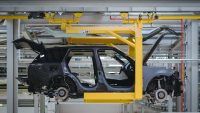Vehicle production in the UK fell for the fifth month in a row in May, with less than 50,000 vehicles rolling off British production lines.
That is according to fresh data from the SMMT, which reveals that production dipped by 32.8% in the fifth month of the year.
The result marks the worst May performance since 1949, excluding 2020, when Covid lockdowns wreaked havoc on the industry.
In the year to date, total outputs are down 12.9% on the same point last year, with the UK building 348,226 vehicles so far – the lowest amount since 1953.
The figures include all cars and commercial vehicles produced in this country throughout 2025.
Looking at cars specifically, production fell by 31.5% to 47,723 unitsin May. The SMMT puts the slump down to ‘ongoing model changeovers, restructuring and the impact of US tariffs’.
Meanwhile, commercial vehicle output was also down sharply, by -53.6% to 2,087 units, as the closure of Stellantis’s Luton plant earlier this year, continues to impact the industry.
Elsewhere, car production for export fell by 27.8%, with shipments to the EU and US – the UK’s two largest markets – falling by fell 22.5% and 55.4% respectively.
The US share of exports declined from 18.2% to 11.3%, largely as a result of Donald Trump’s 25% tariffs. It is hoped that exports to the States will now start to rise after the UK’s new trade deal was completed earlier this month.
Declines were also recorded in exports to China and Turkey, down 11.5% and 51.0% respectively.

Reacting to the results, Mike Hawes, SMMT chief executive, said: ‘While 2025 has proved to be an incredibly challenging year for UK automotive production, there is the beginning of some optimism for the future.
‘Confirmed trade deals with crucial markets, especially the US and a more positive relationship with the EU, as well as government strategies on industry and trade that recognise the critical role the sector plays in driving economic growth, should help recovery.
‘With rapid implementation, particularly on the energy costs constraining our competitiveness, the UK can deliver the jobs, growth and decarbonisation that is desperately needed.’


































